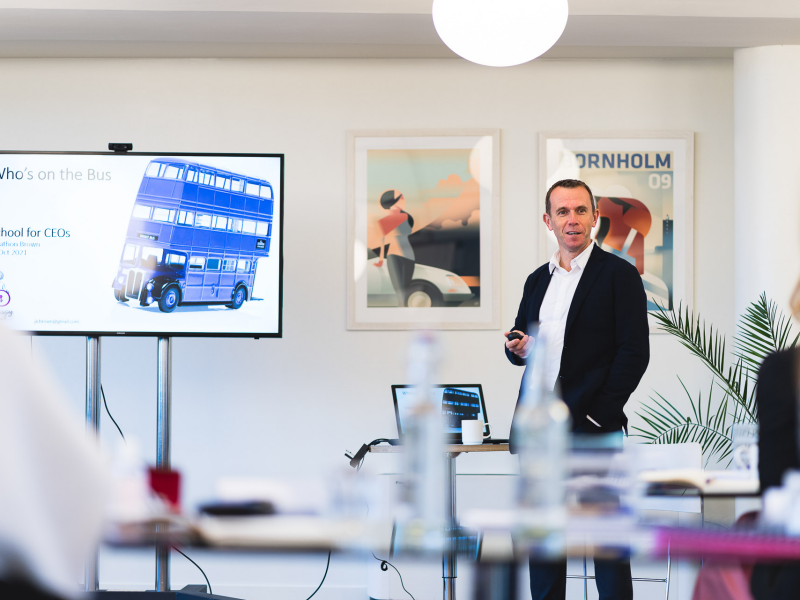Summary
Stakeholder management is one of the most difficult aspects of the CEO role. The unique demands of the role can derail leaders both daring or diligent, collaborative or single-minded. This immersive two-day programme is designed to expose new CEOs and MDs to potential derailers, learning through the experiences of those who have been there before, so that they can step up to CEO with confidence and eyes wide open.
Many leaders combine coaching with the opportunity to attend The Vital Few.
Background
When School for CEOs was first established, we commissioned the research report Stepping Up to CEO, to find out whether more could be done to prepare individuals for the most unique and demanding role of Chief Executive.
93% of the CEOs and Chairs interviewed agreed that prospective CEOs require more preparation specific to the top role, stating that the unique nature of the role contributes to the difficulty in preparing for it:
Everything you’ve ever done prepares you for it, but nothing you’ve ever done prepares you for it…
The Vital Few was borne out of this research and is still considered a flagship programme at School for CEOs.
The emphasis of the programme is on practical lessons for immediate use, and a variety of experienced business leaders and experts from our Faculty join the programme over two days to share real life experiences and learnings in an intimate Chatham House setting.
Each session is anchored in the School’s Dimensions Leadership framework enabling you to consider your leadership in a holistic way.
Agenda
Each of the following topics are anchored in the School’s Dimensions Leadership framework. In addition to the sessions outlined below, participants work through a CEO Dilemma over the two days and the two days are complemented with a single coaching session after the programme.
- Understanding the Derailers: What are the things you really need to know in the first few months as CEO?
- All CEOs are appointed with the intention only to succeed. Do you know the ten most common reasons CEOs fail? How can you avoid them?
- Managing Key Relationships: Who are the vital few that can help you succeed?
- How do you work out who those critical relationships are? What are the ‘unwritten rules’ and how do you work them out? Have you worked out how to manage the dynamic?
- Setting the Agenda: You are now the new appointee – what do you do?
- How do you know what you need? How do you make the necessary decisions? How fast do you move? How do you get the timing right? You want to create the first right impression
- Who’s on the Bus: How to come to some early decisions as to who you need on your top team
- How do you assess what you need? How do you filter the opinions and who do you listen to?
- Leadership in Context
- Understand the various leadership scenarios you may face. How do you intuitively shift your style to suit the situation you face?
- Reputation Management
- Understanding the importance of managing reputation and the impact that stakeholder groups can have is vital. What issues should you consider in managing the media? How do you manage in a crisis?
- Developing Culture: How do you set the tone from the top?
- Can you identify the key culture drivers in the organisation? Learn how to influence them and explore the role of culture development
- Inclusive Leadership: The real game changer
- What does inclusion actually mean, why does it matter and how can it be developed?
- Resilient Minds
- Exploring the relationship between psychological resilience and performance. How do you cope and adapt during periods of high pressure, in the face of change, setbacks and adversity?
- Giving the Killer Speech: How do you use those key moments to project your messages?
- Learn how to master the techniques of good speech writing and delivery, especially in the early days
- Managing Your Brand: Do you know what you want to be known for?
- It’s created quickly and difficult to change, so you will want to get it right from the start
- Coaching: How do you bring this all together?
- What’s your plan? How do you consolidate your thinking and use it to help you succeed?
Participant Profile
Participants come from a wide variety of businesses and backgrounds. This can include quoted, private and family-owned businesses as well as non-profit organisations.
Participants are often new CEOs or Managing Directors, or a member of an Executive Committee. We also welcome existing CEOs looking to refresh their perspective on the CEO role perhaps as you lead your organisation through change.
What our Clients Say
The experience felt very premium with a relaxed style. High quality from start to finish.
(Managing Director, Technology business)
Excellent overall. I gained a lot from the course and also found it very enjoyable and thought provoking. The other delegates were also first class and the level of engagement by all made the course first class
(Group CEO, Manufacturer)
Hugely positive. I have taken numerous actions away. Very important messages and areas to concentrate on that get easily forgotten in the day-to-day business but which are the most impactful - that separate leaders from the weeds to focus on the business not in the business.
(CFO and interim CEO, Asset manager)
I really feel like I have benefitted from the experience. I think there will be many things which will help me with my job and it felt extremely indulgent to sit and be fed information and strategies. I really do feel extremely fortunate to have had this experience.
(CEO, Charity)




